To you, Marrakech
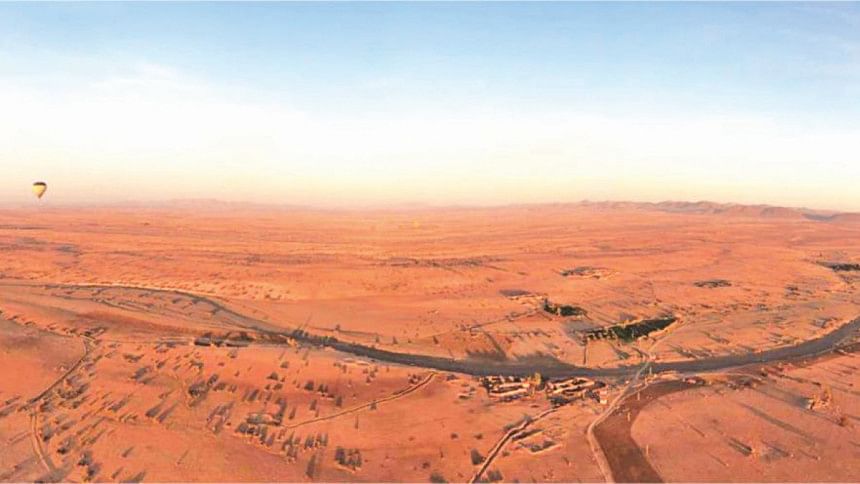
I can't quite remember who picked us up—probably someone from the villa—but they played 'No Scrubs' by TLC in the car and it reminded me of my childhood. Secret hip hop aspirations stormed through my senses, and at once, I felt at ease. Like I knew you Marrakech, and you knew me.
But as we sit here today, you and I, each feeling bloated with hindsight, I think it is safe to say: I was wrong. I will admit this now, as we sit here, today, without our rose-tinted glasses and speak about our time together, me on my honeymoon and you in your 953rd year. But I was wrong, because at that time of night, it took us less than an hour to cut through your centre and reach into your outskirts.
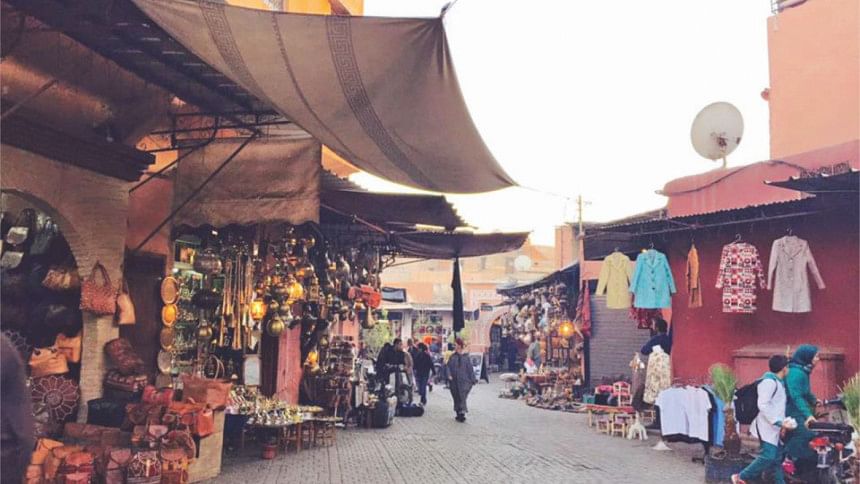
Our resort was in the middle of nowhere, surrounded by nothing. A lone compound of dust-coloured villas crisscrossed by a stone path so shrouded by coarse desert foliage that the torches dotting it on either side like obese, mutant fireflies failed in their object of lighting. I cannot have known you Marrakech, because my insides spluttered with familiar panic at the unfamiliar, tortured by your torches.
The waiting room had lush velvet upholstery. Emerald greens and midnight blues, brooding into high, intricate ceilings. We were served mint tea in gold-rimmed glasses on silver inlay trays, a wafting hint of Arabia, and I noticed for the first time, your fascination with doors. The gateways to your history were arched, carved and padlocked—early signs that you live between centuries and bend the rules of time.
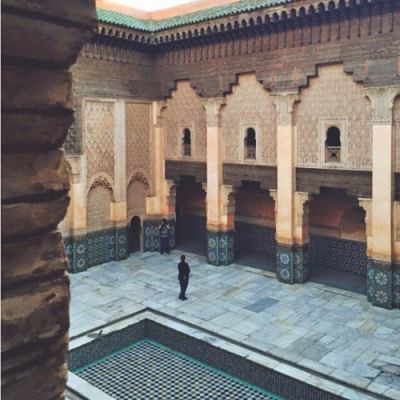
The villa was impeccable. Opulent, sensual. I stood at a glass wall and used the fire in the grate to trace the liquid edges of a pool, but the glow revealed less than it showed and I followed instead a somber group of portraits along a wooden staircase. Before the break of dawn we were picked up for the second time in less than six hours and taken farther from the seat of your Neolithic civilisation (for that is how old you truly are, far beyond 953). In the arid, early morning air a ragtag band of men pumped life into a hot air balloon, letting it swell into the horizon. That heady mix of Arabic and French made for an esophageal list of instructions—your regular how-not-to-die kit—but confronted with the ever transforming, ever strengthening first light of day, they were easy to follow. It made me want to live.
Our ascent was timed to mimic the sun, the higher we rose, the brighter it grew, but for the wary at heart I must clarify: hot air ballooning is a myth of motion. A stillness wrapped in the gift of elevation. You filled me with a sense of emptiness, miles and miles of golden dunes colliding with the sky, and for the first time I realised barren could be beautiful.
By late afternoon, we were heading towards Djemaa El Fna. To me your pièce de résistance. Your market square—a UNESCO Masterpiece of the Oral and Intangible Heritage of Humanity—is a sensory illusion, a sudden trickery into believing in time travel. Low rise sandstone buildings perimeter the courtyard and open to the skies, minarets climbing into the heavens interrupt its horizon. At dusk, the snake charmers and monkey trainers make way for the magicians and the storytellers. I moved past the entertainment into your souq, ancient and glorious, each narrow alleyway a kaleidoscope of chaos, colour and vitality.
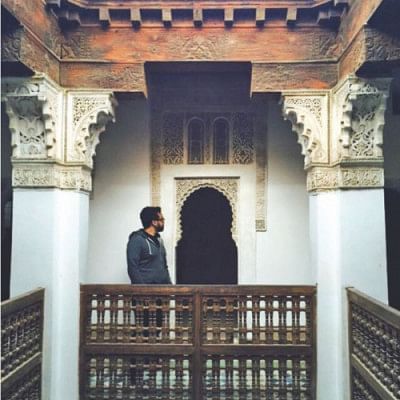
Silver-tongued shopkeepers beckoned for their wares: mounds of spice and prisms of fruit, handmade rugs and hand-carved lamps. There was beauty in your ceramics, in a magnetic sort of way. Something about the water in Fez they said. But they will say anything. I was guided and prodded, prodded and guided to a stall selling Argan oil, made by Berbers in the mountains. Only once a week they come down to Marrakech, they said. Today is the day, they said. And they said it everyday.
Across the souq, small, snaking cafés overlook the market square. I leaned against painted, tiled walls and tried my first tagine, watching traders from past millennia. Floating men in long white robes illuminated their kiosks and I wondered: how different could the scene have been for medieval merchants and warrior horsemen? Not very, and you can tell me, because you were there when they were here.
That is your inimitability, Marrakech, that you have not crumbled under the immense weight of history. Or of modernisation. That there is no Pizza Hut opposite your proverbial pyramids.
We spent the following night at a riad in your medina quarter. The old town. The taxi stopped outside a complex web of passageways, at times constricting us into a single file, at others expanding enough to allow us to walk hand-in-hand. A donkey carried our luggage past the medina's underbelly, into an Andalusian-style courtyard. Two-storied rock house with bedrooms around a garden—the only time I stayed at a house with a fountain in its heart, listening to voices and footsteps carried over a thousand splendid years.
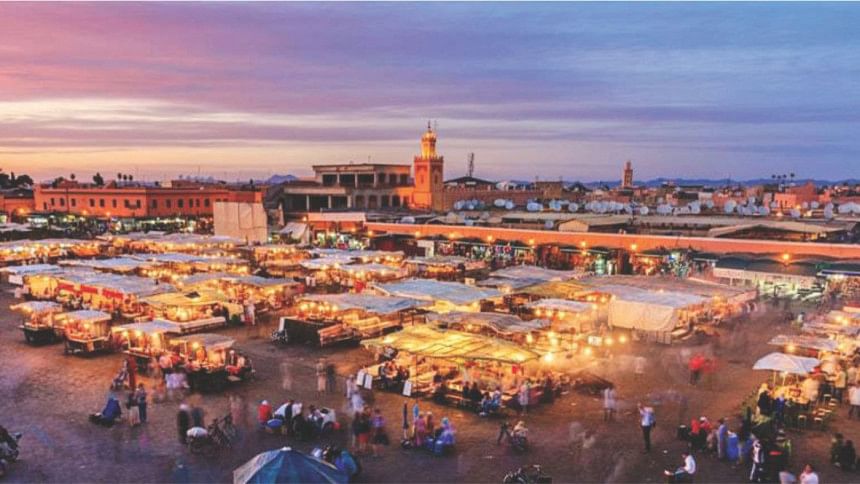
After breakfast on the rooftop, we rode a horse carriage around your citadel, your biblical facades. I took pictures at Ben Youssef Madrasa: the 14th century infrastructure, the vault-like dormitories, the cedar, stucco, tiled courtyard. And at the halls and altars of Bahia Palace. But do photos ever do justice?
Outside Koutoubia Mosque, I craned to see the 250 foot minaret with the ornamented windows. A man came up to me, born of your soil. These are the hours and this is the entrance. Come back later and you can climb the 12th century tower. We returned in the evening, newly-weds, hungry for sunsets. Only to be met with incredulity. There is no climbing and there are no sunsets. There never was, said the old guard. But someone told me, I replied, a friendly passer-by. Yes, he did. He lied.
Why would you do that to me Marrakech? Because hustle is your spirit.
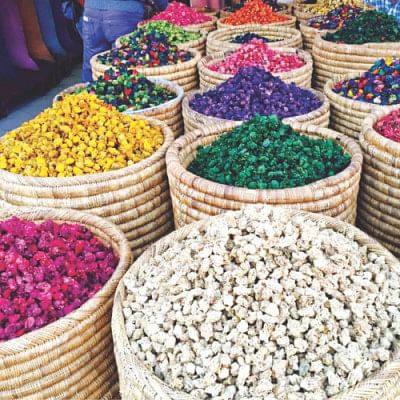
Jilted but not deterred, we were outside your city walls by morning. An eight-hour drive through a stunning change of landscape. We began in the snow-capped Atlas mountains, treacherous swerves and dizzying heights, plateaued in palm plantations and ended in Ourzazate, gateway to the Sahara. I knew little of your topographical diversity, or of your reputation as a noted film location. Between the sand and the sets, Jerusalem stood a mile away from Mecca, the only place they co-exist, theologically or otherwise.
By the final hour, camels replaced SUVs, and we watched a blinding sunset atop bobbing, hunch-backed companions. Your stars were bright, but not nearly enough, and the Berbers danced around a campfire in the thickest of all darkness. That night in the Sahara was the coldest I have ever been, but as we sit here today, you and I, I will admit that I loved it. Loved it a lot more than your hustle, but a lot less than your history.
As we sit here today, you and I, the visitor and the visited, you too must have your full disclosure. Pity your pen has no ink and your words no volume.
Subhi Shama is a development practitioner with an interest in military intelligence.




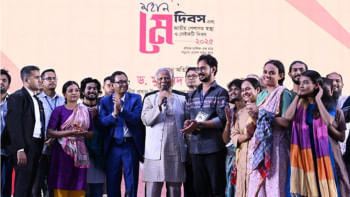
Comments